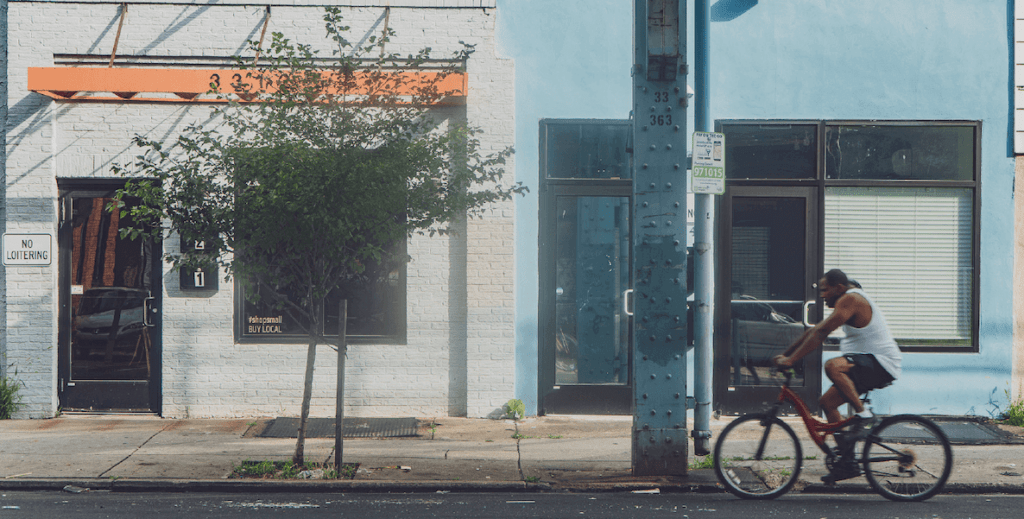All eyes are on Kensington. Last week, Philadelphians watched Mayor Parker take the first steps in her strategy to bring long-needed municipal resources to this neighborhood struggling with systemic issues of poverty, homelessness and drug use. With challenges compounding over decades, change will come slowly, and nowhere is the challenge greater than chaotic, disinvested Kensington Avenue, the once vibrant 1.6-mile long shopping street for working class Philadelphia now pockmarked with vacancy and blight.
It’s hard to imagine a solution for Kensington that doesn’t address revitalizing this organizing spine of the neighborhood along the Market-Frankford transit line. But who should lead and partner in this recovery, and how do you create a corridor capable of nurturing neighborhood small business at a moment when street level retail is struggling throughout the city?
We at Drexel’s Nowak Metro Finance Lab are watching a small, community-led initiative, the Kensington Corridor Trust (KCT), designed to help Kensington Avenue come back with community control at its core. A neighborhood buffeted by both the opioid epidemic and fears of gentrification might seem an unlikely place to experiment with commercial corridor community ownership, but that’s exactly what the founders of the KCT have done.
Barra Foundation, an investor in the KCT, invited Drexel’s Metro Finance Lab, where I’m a senior research fellow, to embed within the process of forming the Trust and document its victories, mistakes and journey in real time. The result is a City Case, The Kensington Corridor Trust: The First Four Years, which provides a how-to for city leaders and community development practitioners considering how a neighborhood trust might preserve affordability and give communities more say in corridor development. And while the model is nascent, the questions the KCT is grappling with are essential for all struggling communities and might offer lessons for how to take greater ownership, not only of property, but also of a neighborhood’s future.
In a city that prides itself on character and culture, the KCT’s community-first model and novel methods provide inspiration and potential lessons for community-driven positive change.
The KCT is a non-profit with a complex but novel structure. Its board is composed entirely of neighborhood residents and small business owners who have created a perpetual purpose trust, a legal entity designed to keep properties in a community-controlled portfolio, with rents affordable and a community say in what goes where. Their goal is bold: Acquire and redevelop real estate on three blocks of disinvested Kensington Avenue and keep it under long-term community control to preserve culture and affordability while building neighborhood power and wealth and combating vacancy and speculative development.
This small experiment has potentially big implications. As most Philadelphia residents know, commercial corridors across the city are struggling, and not just from Covid. Small, local serving businesses have had their customer base cannibalized by big box stores and online retail. Corridors themselves are fragmented — with ownership as varied as the storefronts (or vacancies) themselves — making it difficult for the City to make strategic and coordinated investments. Philadelphians from Point Breeze to Port Richmond know what usually comes next: investment focused on the needs of wealthier new residents moving in gradually shifts a corridor’s composition, parcel by parcel, storefront by storefront, often resulting in long-term residents and businesses being priced out.
To avoid this fate, the KCT activated its innovative governance structure while setting ambitious fundraising goals of $2 million in non-recoverable grants to fund trust formation, operating costs and community engagement efforts, as well as $20 million in patient, low-interest capital to fund the acquisition and development of 60 properties. As of today, the KCT has raised $2.5 million in grants and $10.85 million in loans at interest rates between 0 and 2 percent with a 30-year amortization term, an impressive haul for a civic start-up. It’s still early, but KCT has shown progress: Since 2019, KCT has acquired 20 properties across three blocks of Kensington Avenue and has begun to redevelop and lease these properties to tenants approved by community trust stewards.
Community ownership of commercial corridors is not new, but still uncommon. What makes the KCT’s model novel and worth following is that they’re trying to prove that commercial districts can be improved while catering to the needs of existing residents, rather than try to attract new businesses and customers while changing the neighborhood. It’s an admirable experiment, particularly if the City becomes an active partner contributing publicly-owned land to allow KCT to lower development costs and pass those savings onto local small business owners.
Will this work? Can this model be adopted or adapted elsewhere? We don’t know yet, but we’ll be watching, and Philadelphia should pay attention. In a city that prides itself on character and culture, the KCT’s community-first model and novel methods provide inspiration and potential lessons for community-driven positive change. It may form the foundation for a new day on Kensington Avenue and the neighborhood as a whole.
Correction: A previous version of this post’s cheat sheet misdescribed the type of loans KCT raised. They are loans with interest rates between 0 and 2 percent with a 30-year amortization.
Karen Black is a Senior Research Fellow at the Lindy Institute for Urban Innovation’s Nowak Metro Finance Lab at Drexel University, and is CEO of May 8 Consulting.
The Citizen welcomes guest commentary from community members who represent that it is their own work and their own opinion based on true facts that they know firsthand.

